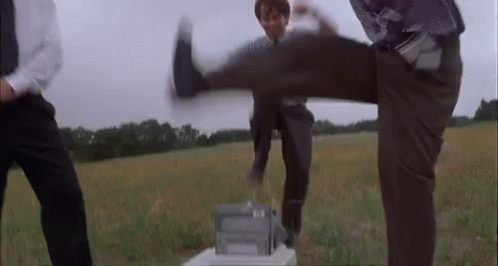It’s all said and done - you know it’s over, but you just can’t stop worrying about it. Whether it’s something you saw or heard or read - it keeps running laps around your mind, eating away at your energy to the point where you can’t focus on anything else.
Now it’s time to banish that thought and get back your focus - this easy technomancy spell can help you do just that!
~ * ~ * ~ * ~ * ~ * ~ * ~ * ~ * ~ * ~
Technomancy (also known as “Techno Magick”) is a type of magick that incorporates modern technology. This spell requires a device that has a word/text processor and a digital trash bin. Feel free to use your computer, laptop, tablet, or phone ![]()
![]()
You will need:
-
 Word/text processor
Word/text processor -
 Digital trash bin
Digital trash bin
Spell Instructions:
-
Find a quiet and safe place to sit. Take out your device (phone/computer/tablet/etc) and place it in front of you.
-
Open up a blank text document. Take three deep breaths to help ground yourself.
-
Write: the situation. Where did it happen? What words were said? Who was involved? Use a bird’s eye or third-party perspective, looking in on the situation from afar. State only the facts here.
-
Hit the ‘enter
 ’ key (or whichever button starts a new line on your device) three times.
’ key (or whichever button starts a new line on your device) three times. -
Write: your feelings. How did you feel in the moment? How do you feel now? Why do you think you feel this way?
-
Hit the ‘enter
 ’ key (or whichever button starts a new line on your device) three times.
’ key (or whichever button starts a new line on your device) three times. -
Write:
This is done, it’s in the past.
I came, I saw, I felt, I cast
I release the thought that no longer serves
To ease my mind and free my nerves
An end to worries, no longer stressed-
I say goodbye and lay it to rest.
-
Save the file to your desktop or a folder on your device. Close it.
-
Go to where the file is on your device. Take three deep breaths and say, out loud or in your mind:
I have seen, I have felt, and now I let it go.
- Delete the file. Say:
I forgive you. I release you. Rest peacefully.
- Take three deep, grounding breaths. You are now free to move forward.
Anti-Anxiety Spells 
Looking for related spellwork? Here are some additional spells and other resources you might explore.
Please make sure you are logged into your Spells8 Account to be able to view all of these resources!

Anti-Anxiety Spell Jar with Herbs & Crystals

Self-Compassion Meditation for Difficult Times

Sanctuary: A Calming Tea Spell for Peace & Safety

Spells for Anxiety & Stress Relief
What spells, meditations, rituals, etc do you use to overcome stress?
Feel free to share your spell experiences, advice, and wisdom with fellow coven members in the comments below.
Blessed Be! ![]()




